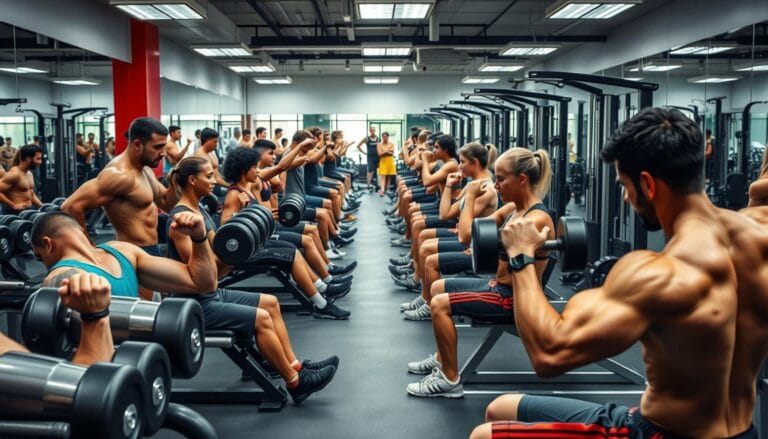Top 10 Kettlebell Chest Exercises for Building Stronger Pecs
Starting your fitness journey? You’re probably looking for ways to strengthen your chest. Kettlebell chest exercises are a great choice. They combine strength training with flexibility. This makes your upper body stronger and your chest more defined.
Kettlebell exercises, like the flat kettlebell press, offer more movement and muscle stretch. This can lead to muscle growth and better chest development. Adding kettlebell workouts to your routine boosts strength and muscle mass. They’re a great alternative to traditional bench press exercises.
Whether you’re new to fitness or advanced, kettlebell chest exercises fit your level. They’re an effective way to build stronger pecs and improve your fitness.
Table of Contents
Understanding Kettlebell Training for Chest Development
Kettlebell training is a unique way to work on your chest. It offers many benefits that can make your workouts better. Using kettlebells can help you get stronger, improve muscle activation, and boost your fitness.
Kettlebell training works your chest muscles in different ways. You can do kettlebell chest flys, push-ups, and bench presses. Each exercise targets your chest from a different angle, making your workout more complete.
To get the most out of kettlebell training, focus on proper form. Keep your shoulders back, feet flat, and core tight. This helps you stay balanced and in control. By doing this, you can see the benefits of kettlebell training and improve your chest.
Some key benefits of kettlebell training for your chest include:
- Improved muscle activation and engagement of stabilizer muscles
- Increased strength and overall fitness
- Enhanced core stability and balance
- A more comprehensive workout compared to traditional weights
By learning about kettlebell training and adding these exercises to your routine, you can see many benefits. Kettlebell training is great for anyone, whether you’re just starting out or are already fit. It can help you reach your fitness goals and improve your health.
Essential Equipment and Setup for Kettlebell Chest Exercises
To start kettlebell chest exercises, you need the right gear and a good setup. You’ll need a kettlebell, a comfy workout area, and to know how to do the exercises right. It’s key to pick a kettlebell that matches your fitness level and goals. For chest exercises, choose a weight that lets you do the right number of reps with good form.
A good workout setup is also important for kettlebell chest exercises. You need a clear, stable area without distractions or things in the way. Think about the floor and if you need extra stuff like a mat or bench for some moves. With the right kettlebell and a safe, effective space, you can focus on your chest exercises and reach your fitness goals.
- Choosing a kettlebell weight that suits your fitness level and goals
- Creating a clear and stable workout space, free from distractions and obstacles
- Investing in any additional equipment, such as a mat or bench, that may be necessary for certain exercises
By following these tips and getting the right kettlebell and workout setup, you can improve your chest exercises. You’ll get a stronger, more toned chest.
Proper Form and Technique Fundamentals
When doing kettlebell exercises, proper technique is key. It helps you work the right muscles and avoid injuries. Knowing the different grip types, like the rack and hang positions, is crucial. It helps you control the kettlebell and use your power effectively.
Starting your kettlebell journey means building a strong foundation. You need to learn how to hold the kettlebell, position your body, and breathe right. Mastering these basics lets you do kettlebell exercises with confidence and precision. This way, you’re more likely to succeed and stay safe.
- Keep your core tight to stay stable and powerful
- Use the right grip for each exercise, like the rack for presses
- Keep your body aligned to target the right muscles
By focusing on proper technique and form, you’ll get the most out of your workouts. Always put form first, even if it means using lighter weights. Start with lighter weights and gradually increase them as you get more comfortable.
Best Kettlebell Chest Exercises for Beginners
Starting with kettlebell exercises for beginners means focusing on chest exercises that are safe and effective. It’s key to include a mix of exercises that work different muscle groups, like the chest. The kettlebell push-up and kettlebell floor press are great for beginners.
A good beginner workout routine might have 8-12 reps of each exercise. Do the circuit 2-3 times for the best results. Start with lighter weights, like 8-12 kg (18-26 lbs), and increase them as you get stronger.
Some top kettlebell chest exercises for beginners are:
- Kettlebell push-ups: This exercise works many muscles and offers full range movement.
- Kettlebell floor press: It targets the chest and is a good alternative to regular push-ups.
- Kettlebell chest fly: This exercise focuses on the chest muscles and allows for a wide motion, which can improve flexibility.
Always focus on proper form and technique when doing kettlebell exercises. Start with lighter weights and gradually increase them. With regular practice and patience, you’ll see big improvements in your chest muscles and overall fitness.
Advanced Kettlebell Movements for Chest Growth
Ready to boost your chest workout? It’s time to add advanced kettlebell exercises to your routine. These moves challenge your muscles and help with chest growth. They use complex patterns and combinations to work your chest from different angles.
Effective exercises include the kettlebell chest fly, bench press, and push-up. They target the chest, shoulders, and triceps. You can adjust them to fit your fitness level. Increase the weight or range to challenge your muscles more.
It’s crucial to focus on form and technique to avoid injury and maximize your workout. Keep your core engaged, back straight, and use a full range of motion. By doing advanced kettlebell exercises and focusing on progressive overload, you’ll see big gains in chest growth.
Advanced kettlebell exercises offer many benefits for chest growth, including:
- Increased muscle engagement and challenge
- Improved progressive overload and muscle growth
- Enhanced overall fitness and athleticism
By adding these exercises to your routine and focusing on proper form, you’ll see significant chest growth. Your workout will reach new heights.
Common Mistakes to Avoid During Kettlebell Training
When doing kettlebell exercises, it’s key to steer clear of common errors. These mistakes can cause injuries or make your workouts less effective. One big mistake is poor form, which can harm your muscles and joints. Make sure to keep your body aligned right and use your core during the exercise.
Also, don’t skip the warm-up and cool-down. Not warming up can strain your muscles, and skipping the cool-down can make you stiffer and more sore. Use training tips like dynamic stretching and foam rolling to boost your performance and lower injury risks.
Some common mistakes to watch out for during kettlebell training include:
- Swinging the kettlebell with poor form
- Not engaging the core
- Not warming up or cooling down properly
- Overtraining or undertraining

Knowing these common errors and using training tips can make your kettlebell workouts better. Always focus on the right form and technique. If you’re unsure, get help from a qualified trainer or instructor.
| Mistake | Correction |
|---|---|
| Poor form | Focus on proper body alignment and engage your core |
| Insufficient warm-up | Incorporate dynamic stretching and foam rolling |
| Overtraining | Listen to your body and rest when needed |
Incorporating Kettlebell Chest Exercises into Your Workout
To get the most out of your kettlebell workouts, add kettlebell chest exercises to your routine. Create a kettlebell workout routine that targets different muscle groups. Remember, rest and recovery are key to muscle repair and growth.
Success in kettlebell workouts comes from progressive programming. This means slowly increasing the workout’s intensity. You can do this by adding weight, reps, or sets, or by reducing rest time. This approach helps build a stronger, more defined chest.
Here are some tips for your kettlebell workout routine:
- Start with lighter weights and gradually increase the weight as you become stronger
- Focus on proper form and technique to avoid injury
- Incorporate a mix of exercises that target different muscle groups
- Allow for adequate rest and recovery time between workouts
By following these tips and adding kettlebell chest exercises, you can strengthen and define your chest. Always prioritize proper form and technique. Also, make sure to rest and recover enough to avoid injury and support muscle growth.
| Exercise | Reps | Sets |
|---|---|---|
| Kettlebell Chest Fly | 10-12 | 3-4 |
| Kettlebell Push-up | 8-10 | 3-4 |
| Kettlebell Floor Press | 8-10 | 3-4 |
Safety Considerations and Injury Prevention
When you’re doing kettlebell training, safety considerations and injury prevention are key. They help make sure your workout is safe and healthy. It’s important to know the risks and take steps to avoid injuries. Kettlebell safety means warming up, cooling down, and training with a partner for support.
To avoid injuries, follow training tips and guidelines. Start with light weights and slowly add more as you get better. Also, focus on how you move your body to prevent strains and sprains. Important kettlebell safety tips include:
- Proper grip and hand positioning
- Body alignment and posture
- Controlled movements and breathing
- Warm-up and cool-down routines
By following these training tips and being careful with kettlebell safety, you can have a safe and effective workout. Always put injury prevention first and take steps to protect yourself.
Nutrition Tips to Support Chest Development
Building stronger chest muscles starts with proper nutrition. A balanced diet fuels your body for recovery and muscle growth. Focus on lean proteins, complex carbs, and healthy fats for best results.
Pre-workout nutrition is key. Eat a mix of carbs and protein 30-60 minutes before working out. This boosts energy and muscle function. Good options include:
- Banana with peanut butter
- Energy bar with protein and complex carbohydrates
- Greek yogurt with berries and honey
Don’t forget about post-workout recovery fuel. Eat a mix of carbs and protein within 30-60 minutes after working out. This helps with muscle recovery and growth.

Follow these nutrition tips and eat a balanced diet to support chest development. Stay hydrated, listen to your body, and adjust your diet as needed for the best results.
| Nutrient | Recommended Daily Intake |
|---|---|
| Protein | 1.2-1.6 grams per kilogram of body weight |
| Carbohydrates | 2-3 grams per kilogram of body weight |
| Healthy Fats | 0.5-1 gram per kilogram of body weight |
Measuring Progress and Setting Goals
As you keep doing kettlebell chest exercises, it’s key to track your progress and set goals. Measuring progress keeps you motivated and focused. Use tools like a workout log or fitness apps to track your journey.
When setting goals, think about what you want to achieve in a certain time. For instance, aim to do 20% more kettlebell snatches in 6 weeks. Break big goals into smaller steps. Use tracking methods to see how you’re doing.
- Workout frequency and duration
- Weight lifted and repetitions completed
- Rest and recovery time
- Nutrition and calorie intake
By watching these metrics and using good tracking methods, you can see how you’re doing. This helps you adjust your workout plan as needed.
Supplementary Exercises to Enhance Your Kettlebell Training
To boost your kettlebell workouts, try adding supplementary exercises to your routine. These can help grow your chest muscles and make your kettlebell training better. By mixing in exercise variations, you can focus on different muscles and make your workouts more effective.
Some great supplementary exercises include:
- Push-ups with kettlebells
- Kettlebell rows
- Planks with kettlebell lifts
These exercises can boost your strength and endurance. They also make your kettlebell training more effective. Start with lighter weights and slowly add more as you get better.
Adding these supplementary exercises to your routine can enhance your kettlebell training. With regular practice and hard work, you can reach your fitness goals. You’ll enjoy a stronger, healthier body.
Conclusion: Mastering Your Kettlebell Chest Workout Journey
Adding kettlebell chest exercises to your routine can really change your game. It helps build a stronger, more defined chest. By learning the right techniques and pushing yourself harder, you’ll reach your fitness goals.
Remember, mastering the kettlebell chest workout journey takes time, effort, and a desire to learn. Stay dedicated, focus on form, and try new exercises to keep your muscles on their toes.
With the workout tips and knowledge from this article, you’re ready to level up your kettlebell chest workouts. Embrace the challenge, track your progress, and enjoy the journey to a chest that turns heads.






